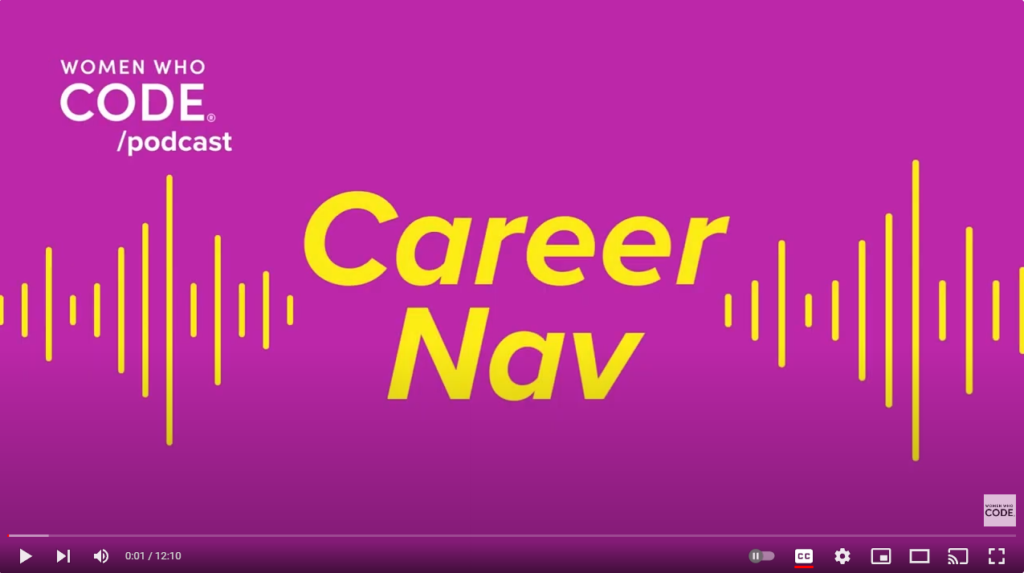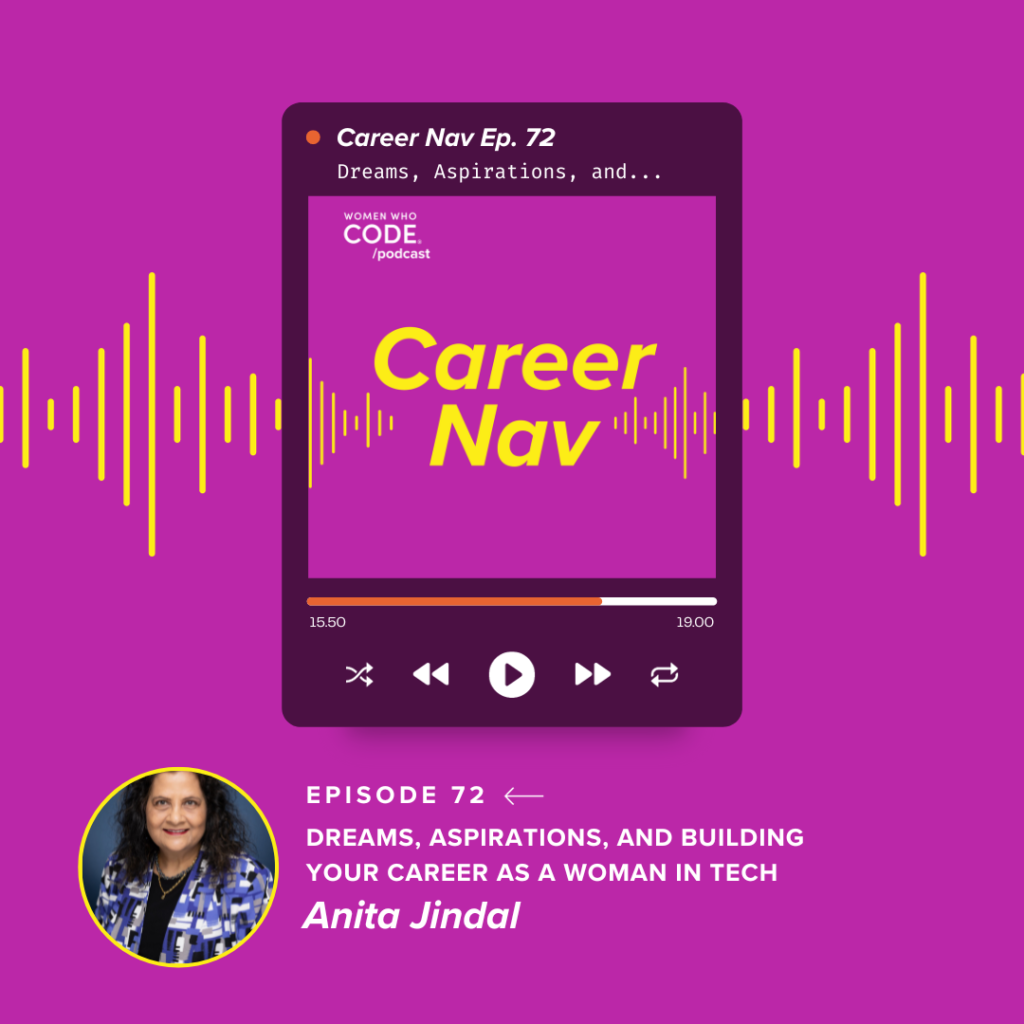Career Nav #72: Dreams, Aspirations, and Building Your Career as a Woman in Tech
Written by Anita Jindal

iTunes – Spotify – Google – Video – More Episodes
Anita Jindal, Senior Director of Engineering at VMware, shares her talk, “Dreams and Aspirations and Building your Career as Women in Tech.” She discusses the game changers of her career journey: believing in yourself, exploring and taking risks, building a board of trusted advisors, building your brand, and continually learning.
I can sum up my memoir as an adventurous life, inspirational experiences, and treasured memories. I was born in Delhi, India, as the youngest of four daughters. My father was an author, an educator, and a professor at Delhi University, India. My mom was a homemaker and a very strong woman with independent thinking. I learned my communication and life skills from my mother, the drive for my education, and my passion for my field from my father. My parents always encouraged us, supported us, and defied the norms of Indian society to give us the best education.
They always encouraged us to follow our dreams. That included my travel across the world to further my growth. Growing up, my dad used to share stories about these machines that could solve mathematical problems and launch satellites in space. As a child, I was intrigued and always dreamed of working with computers. I finished my master’s in computer science and joined a Ph.D. program in the United States. I started as an engineer and progressed through management and leadership roles. As I progressed through this journey, each experience was unique, shaping me into the person I am today. I will share some of these insights with you.
Number one, believe in yourself. Dream big, be bold. Before joining the industry, I wanted to complete a PhD in computer science. I had to pass a qualifier as the first gate for joining the PhD program. I had a lot of naysayers during this time who tried to pull me down. The system in the US is entirely different from India. It is very difficult to pass a qualifier. “Why don’t you take the master’s and be done with it?” All these comments brought in a fear of failure and self-doubt. I had a dream, and I focused on my goal. Despite these criticisms, I pushed forward and earned my Ph.D.
At that time, I did not know about imposter syndrome. It’s a well-known term in the industry where our fear of failure keeps us from pushing forward and keeps us pinned to the floor. Often, women shy away from sharing their ideas, thinking they’re not good enough. When looking for a topic for my PhD, I encountered a problem that was not solved before and discussed it with my advisor, which became my research topic. Women also experience low self-esteem or self-confidence due to others critiquing their ideas, code, or whatever they discuss.
Whenever you are in these situations, always focus on moving forward. Reflect on your accomplishments, the complexity of your problems, and the innovative products you have delivered. Some of these techniques will help you understand the impact that you’re making through your contributions. They will also help you articulate your value and boost your self-confidence.
Number two is to explore and take risks. Exploring and taking risks is vital for personal development, growth, and learning. I was an engineer at heart and a senior engineer when an opportunity came my way for a management role. My director noticed my collaboration and influence skills across different teams and offered me a management role. I was skeptical and unsure of what to expect. I saw this as an opportunity to grow beyond my technical skills.
The move into management opened up a whole new world of strategic thinking, collaboration, influence, and building high-performance teams. As a new manager, I was given a strategic project to be delivered in a fixed timeframe. This was a brand new area and had never been done before. I took up that challenge and led my team to deliver the first web services and reference implementation. This became the foundation of the Java Web Services Foundation in the Java platform.
This experience shaped my character into taking risks, exploring uncharted territories, and leading teams to deliver successful outcomes. Since then, my teams have delivered several innovative products, first platforms, and products for the companies. We often face situations where we do not know the result or outcome. Unless we explore and take risks, we miss once-in-a-lifetime opportunities for learning and growth.
Number three is to build your board of trusted advisors. When I started my career, I used to be the only female engineer on the team. I built relationships with my colleagues. I worked with my colleagues and across teams to deliver my projects. In the process, my colleagues grew to learn about my strengths. They built trust and confidence in my skills.
To this day, I still remember one instance where one of my former colleagues kept contacting me for a role on his team. They had a project constantly missing deadlines, and he was confident I could turn the situation around. I kept declining. My colleague was persistent, and he said, “Anita, you don’t have to take the job. Just come and have lunch with me.” If I reflect and look back at this experience, I would do that differently today. I would not shy away from meeting my colleagues. I would keep my network alive and nurture those relationships. Throughout my career, I also built relationships with my managers.
I used their input for my personal development. My leadership journey started when one of my former managers was setting up a brand new organization, and she was looking for a leader to lead that organization. She knew about my strengths and contacted me with that opportunity. As I started attending the different conferences and women in technology forums, I learned the importance of building a board of trusted advisors. These are the set of people you can reach out to for advice in challenging situations. You can use these people as a sounding board for discussing your ideas, thoughts, and opinions. These people can also be your pathway to new introductions and opportunities. Therefore, nurture your network and build a board of trusted advisors.
Number four is to build your brand. When I started my career, there was a term called the elevator pitch. It was a 60-second pitch about what you would tell an executive if you happened to meet them in an elevator. There wasn’t much guidance around how to put it together. A lot of us used to talk about what we were currently working on or our responsibilities. It was also recommended that women brag about their accomplishments. I was very uncomfortable doing so, and then later on, I realized that I wasn’t alone in feeling that way. I used to keep my head down, working, but I was very uncomfortable about bragging. In the last decade, a new term called the personal brand has been defined or has become very popular.
Personal brand is not about what you’re currently doing. It is about your awesomeness. It is about who you are as an individual. What are you good at? What can you offer to others? How do you differentiate yourself from others? You can build your brand through your contributions, through working across teams, and through the execution that you’re doing on the project. As people see you in action, they will build trust and confidence in your skills. They will also know about your strengths. As they learn more about you, they will tap into your expertise for different projects and initiatives. Building a personal brand will also help you expand your network and build a board of trusted advisors. Number five is to learn continually. The industry changes quickly, and we must continually learn to keep up. Throughout my career, I have learned new technologies and new domains. In the last decade, I started in the CORBA, distributed computing, and web services world. I transitioned into and learned about big data, data science, machine learning, and the cloud. We must continuously learn new technologies so that we can, in turn, leverage them to deliver innovative features and value for our customers. Personal growth also comes from giving back to the community.
During my career journey, I have learned from every experience. I share these experiences with others so they do not have to learn it hard. As I reflect on my journey, we did not have women in technology forums to learn about the challenges faced by women. Most of us had to experiment, learn from our experiences, forge ahead, and progress. Companies are investing in diversity and equity inclusion initiatives and employee resource groups. These employee resource groups also offer resources for training or for attending conferences and networking. If you have these capabilities available today, use them for learning, networking, and growth.
***************
Video: https://youtu.be/3fAZrFFFUF0
Guest: Anita Jindal, Senior Director of Engineering at VMware
https://www.linkedin.com/in/anitajindal/
Producer: JL Lewitin, Senior Producer, Women Who Code
